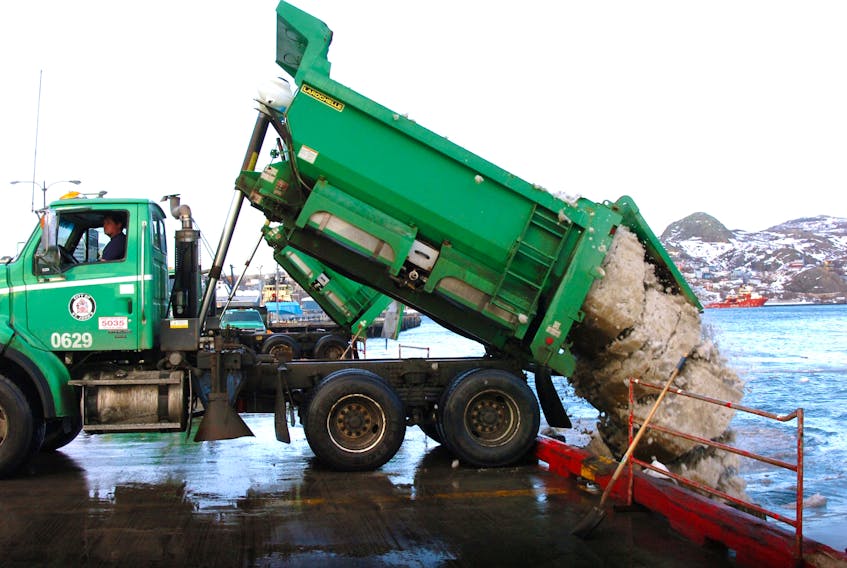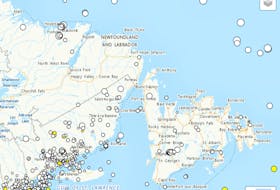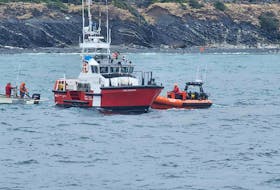The sight of city trucks lined up to dump tons of snow into St. John’s harbour is usually a welcome one for residents.
After all, following huge snowfalls like the ones the capital city has seen in recent weeks, most people are just glad to see city streets rid of as much of the white stuff as possible.
But it’s not just snow that gets unloaded into the harbour waters when trucks clear downtown streets.
There are plenty of contaminates mixed in with the snow that get picked up — everything from plastics and other garbage to chemicals such as brake fluid, antifreeze, oil, gasoline and diesel.
“All those bodies of water, including lakes, rivers and oceans, are getting to the stage where they have more trash and pollution in them than fish. … It’s a problem.”
Memorial University biology professor Ian Jones
Dumping such hazardous material into the ocean clearly violates federal law — in particular Section 36(3) of the Fisheries Act, which prohibits the deposit of any deleterious substances in water frequented by fish unless authorized by federal regulations.
According to Environment and Climate Change Canada (ECCC) — which administers and enforces the pollution prevention provisions of Fisheries and Oceans Canada’s Fisheries Act — “disposal of any material in fish-bearing waters must be compliant with all applicable legislation, including the Fisheries Act.”
However, it’s a law that’s obviously not enforced, as the City of St. John’s has been doing it for decades.
Ward 4 Coun. Ian Froude said the city is aware of the federal government rules and admits it doesn’t have a specific permit to dump snow into the harbour.
Froude said the city has been looking into it, but finding alternative solutions has been challenging, as it would mean huge additional costs — both financially and environmentally.
“If we weren’t dumping snow that’s removed from the downtown into the harbour, then that has to be trucked somewhere that’s quite far away. So, there’s the cost of doing that,” Froude said. “Then, the cost of burning fuel to move that volume of snow to an area that’s potentially quite far away.”
Then there’s the cost of the facility to dump the snow.
“We can’t just dump it anywhere,” he said.
“It would have to be an engineered site with proper drainage because it would be a significant amount of snow.”
Dumping snow into a harbour is a common practice in many municipalities across North American.
For many years, it’s been a hot topic in Halifax, where the city has a firm policy against dumping snow into its harbour, yet it continues to be carried out by the Halifax Port Authority and the Waterfront Development Corp., which are under federal jurisdiction.
Memorial University biology professor Ian Jones said it’s a practice that has to stop.
“All those bodies of water, including lakes, rivers and oceans, are getting to the stage where they have more trash and pollution in them than fish. … It’s a problem,” Jones said.
“The environment is what provides us with our food and our habitat. It’s fundamental for human life, our economy, everything, and its protection is of paramount importance.”
Jones said the city’s explanation that trucking snow elsewhere is too expensive is “a typical polluter’s argument.”
“Eliminating one source of nasty stuff going into (the harbour) would make the harbour a better, cleaner place for fish, wildlife and people.”
Jones said the federal rules against dumping snow into harbours should be better enforced.
“The Fisheries Act is one of the pieces of legislation that is the least enforced of all legislation,” he said. “In fact, generally, environmental laws are not enforced. It’s ridiculous.”
Jones said the environment is too important to ignore, and added that municipal, provincial and federal governments should do all they can to protect it.
“It’s good that the city is under pressure not to dump contaminating substances into the ocean via snow dumping,” he said. “On the other hand, going after them is sort of like handing speeding tickets at the Indy 500. … There’s a lot of polluting going on and prohibitions on the city dumping in the harbour is a start.”
He said if people understood its importance, the ECCC would be under more political pressure to carry out more enforcement.
When asked Friday about enforcement regarding the city’s dumping of snow into the harbour, the ECCC wasn’t able to provide an answer by deadline.
It said anyone who becomes aware of the release of a deleterious substance can contact the 24-hour emergency telephone number at 1-800-563-9089. The number is operated co-operatively by ECCC, the Canadian Coast Guard and the Government of Newfoundland and Labrador.
Twitter: TelyRosie









